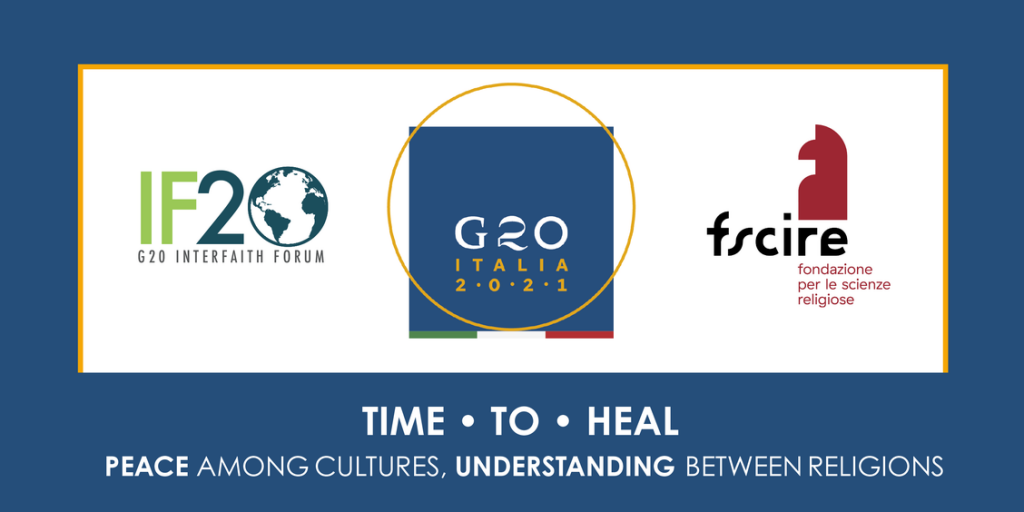
May 2021 Newsletter
Upcoming Events
Event Summaries
Quick Links
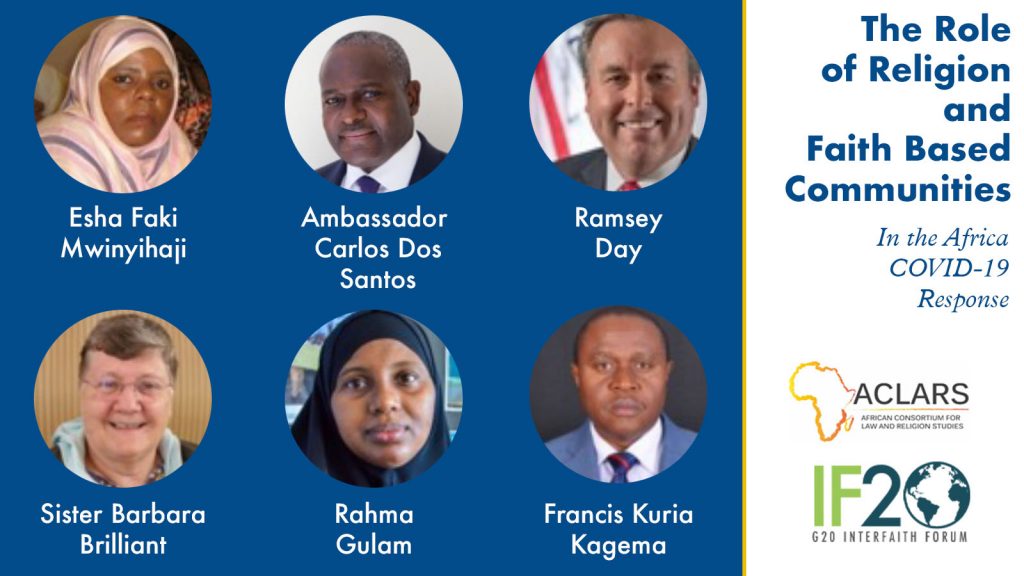
WEBINAR | The role of faith-based communities in the African COVID-19 response – Day 1
On Tuesday, April 20th, the G20 Interfaith Forum partnered with the African Consortium for Law and Religion Studies (ACLARS) in a joint webinar focusing on “The Role of Religion and Faith-Based Communities in the African COVID-19 Response.” Panelists included Dr. Esha Faki Mwinyihaji, Faculty Member at Maseno University, Kenya; Ambassador Carlos Dos Santos, Ambassador of the Republic of Mozambique to the United States; Ramsey Day, Former Assistant Administrator of the Bureau for Africa at USAID; Sister Barbara Brillant, Dean of the Mother Patern College of Health Sciences, Liberia; and Rahma Gulam, Acting Executive Director of Muslims for Human Rights, Kenya.
The event highlighted the wide range ofresponses to the pandemic across the continent, looking specifically at how lessons learned from past health crises in Africa have been applied to the global pandemic, and what role religion and faith-based organizations have played (and could continue to play) in the crisis. Panelists spoke frankly about the failures and victories of different efforts throughout the continent, pointing toward responsibilities and possible actions to improve those efforts moving forward. The health and infrastructure based discussion closely aligned with G20 concerns, foreshadowing issues that may prove central to the respective G20 Summit and G20 Interfaith Forum meetings in Italy this year.
Dr. Esha Faki Mwinyihaji acted as moderator for the discussion and welcomed all participants, introducing the speakers and the importance of the issue at hand.
Ambassador Carlos Dos Santos
Ambassador Carlos Dos Santos focused his remarks on various aspects of Mozambique’s response to the COVID-19 pandemic. He emphasized that in addition to the obvious health crisis presented by the pandemic, which put relatively weak health systems throughout the continent to the test, the economic and social impacts of COVID-19 in every country in Africa have been monumental.
Mozambique began preparing for the pandemic before they even had a confirmed case of COVID-19, putting together civic and scientific committees, looking at what needed to be done, and planning to assist the country’s most vulnerable, which «almost doubled in number during the pandemic», especially as numbers surged to all-time highs during January and February’s “second wave”.
Dos Santos praised the efforts of religious organizations in partnering with the government to disseminate information, promote civic education, and show by example what needs to be done:
When a priest or an imam or a sheikh wears a mask or uses hand sanitizer, that makes an impact in their congregation, helping the country as a whole.
Ramsey Day
Ramsey Day drew on his experiences with USAID during past major health challenges in Africa:
The faith community has not only been critical in the past, but that importance is only increasing. It’s no secret that there are major health challenges across the African continent – not just COVID, but also its ripple effects with HIV, malaria, and tuberculosis. People are struggling to get treatment, and we won’t be successful in regaining the losses we’re experiencing without robust engagement from faith-based organizations.
He emphasized three aspects of faith-based organizations that are critical in every health or humanitarian crisis:
- Access. International donors and large organizations don’t often have access to the most vulnerable, while faith-based organizations have existing direct networks on the ground. 2. Trust. Many African communities have considerable trauma and little trust toward large government or NGO organizations due to various experiences, whereas institutions in the faith-based community garner almost inherent trust.
- Local Knowledge. International interveners do not have the knowledge and understanding to be truly effective on a local level. Faith-based organizations know their communities well.
Sister Barbara Brillant
Sister Brillant referenced her experiences as the Dean of a college of health sciences, watching the lack of response to the pandemic in the students and staff around her:
Right now, COVID is a totally different story than it was with Ebola. In Liberia, people don’t see others dying, so they don’t believe it. And if somebody doesn’t believe something is a threat, they aren’t going to respond.
She spoke of a general lack of precautionary measures in Liberia (which has remained relatively unscathed throughout the crisis), along with a lack of political will with vaccines, postponing rollout and increasing vaccine hesitancy. Based on the attitudes toward the crisis she has seen around her, Sister Brillant predicted that encouraging people to take the vaccine throughout some African nations is going to be a struggle.
Rahma Gulam Abbas
Rahma Gulam Abbas focused her remarks on patterns in society and infrastructure throughout Africa which have exacerbated the crisis in Kenya, one of the countries that has been hit hardest by COVID-19.
She said they were less prepared to respond to healthcare emergencies, with weak healthcare systems and one of the lowest capacities for critical and intensive care in the world. In addition, there has been significant pushback from communities where social and religious gatherings are banned, and the halting of business activities has made the poor even poorer – increasing pushback.
Due to poor infrastructure, many vaccine doses are going to waste during transport, etc. There are huge logistical challenges in keeping things cold, getting two doses done – along with low availability of the vaccine in the first place, which is further complicated by geopolitics and dependance on other countries with larger economies.
She emphasized the need to end the «blame game» currently being perpetrated between religious and political leaders by inviting religious actors to the table and getting their assistance in spreading effective information, tailored for community structures.
Moving Forward
After a short Q&A session looking at different levels of response, relationships between religious actors and governments, and strategies to build trust, a few speakers offered closing remarks.
Ambassador Dos Santos called the frank discussion an «eye-opener», emphasizing the need to continue to collaborate and find ways to contribute to a better future:
I think this pandemic is a test of our humanity, and when it is gone, we will be judged by what we have done to assist the most vulnerable. And religious organizations have been a great example of that.
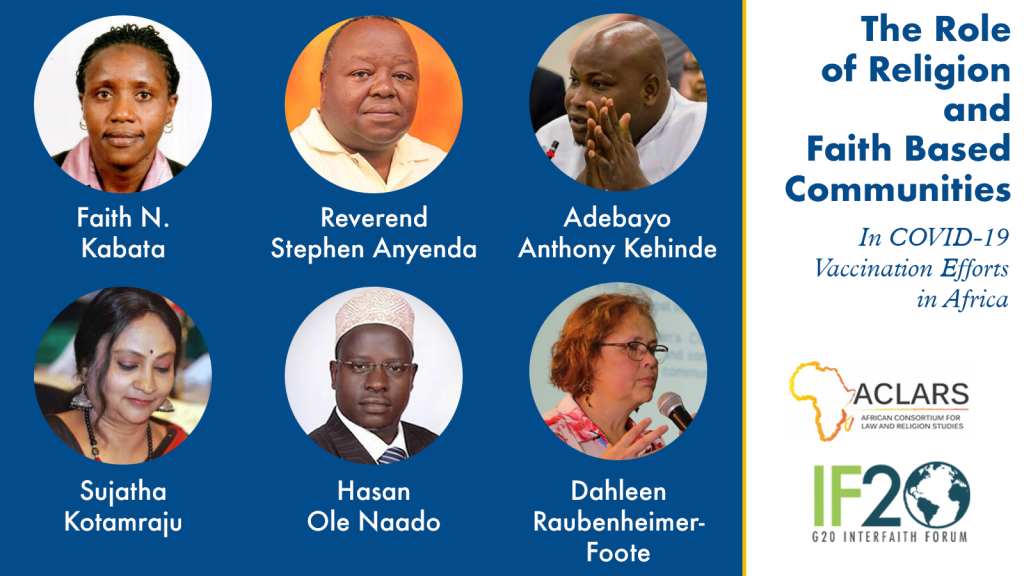
WEBINAR | The Role of Religion and Faith-Based Communities in COVID-19 Vaccination Efforts in Africa – Day 2
On Tuesday, April 27th, the G20 Interfaith Forum partnered again with the African Consortium for Law and Religion Studies (ACLARS) to hold a follow-up webinar to last week’s event, focusing on “The Role of Religion and Faith-Based Communities in COVID-19 Vaccination Efforts in Africa.” Panelists included Faith N. Kabata, Acting Dean of the Kenyatta University School of Law in Kenya; Reverend Stephen Anyenda, CEO of the Coast Interfaith Council of Clerics, Kenya; Deacon Adebayo Anthony Kehinde, Ecumenical Officer of the Church of the Lord Worldwide, Nigeria; Sujatha Kotamraju, National General Secretary of the Hindu Council of Kenya; Hassan Ole Naado, National Chairman of the Supreme Council of Kenya Muslims; and Daleen Raubenheimer-Foot, Technical Advisor for Channels of Hope at World Vision, South Africa.
This event highlighted the struggles and roadblocks being faced by the vaccination effort in various African countries; the widespread issues with vaccine acceptance and distribution; and the roles religious leaders and communities are playing to both propel and impede vaccination efforts across the continent. The discussion aligned with concerns expressed by the G20 Interfaith Forum in their official recommendations to the G20 last October and built off of the forum’s recent webinar on COVID-19 vaccination campaigns, foreshadowing issues that will continue to prove central to the respective G20 Summit and G20 Interfaith Forum meetings in Italy this fall.
Faith N. Kabata acted as moderator and welcomed all participants, introducing the speakers and the importance of the discussion:
«This is a very topical issue. With the widespread loss of life connected to COVID-19, along with its economic and social implications, one would expect vaccine acceptance rates to be high. But when the vaccine arrived, despite expectations, less than 2% of administered vaccines have been in Africa. Why is the acceptance rate so low, and what role can religion and religious leaders play?»
Rev. Dr. Stephen Anyenda
Rev. Anyenda focused his remarks on the reasoning behind vaccine hesitancy that he’d observed in Kenya and the role religious leaders could play in helping the vaccination rate to increase. He explained that when the vaccines arrived in Africa, they arrived with a lot of “noise” – rumors flying on social media that the vaccines were secretly a family planning or population control tool, etc. Due to high levels of trust in religious leaders, they were in an ideal position to promote the vaccine and spread hope to combat the devastation of the pandemic:
«The pulpits and places of worship had to offer an alternative narrative to what was going around on social media. They had to be the first ones to ‘step into the water’ and take the vaccine».
Deacon Adebayo Anthony Kehinde
Deacon Kehinde reemphasized Rev. Anyenda’s comments on people’s trust in religious leaders, citing that over 98% of the Nigerian population claimed a religion, and therefore religious leaders have a huge influence, whether for good or bad. When Nigeria announced lockdown measures, some religious leaders opted to ignore them and continue with their religious services, and many in the general population followed suit, showing that they were more likely to listen to the words of religious leaders than to government leaders and political elites. He encouraged faith communities to use that influence and power for support:
«One of the major recommendations I’m making this afternoon is for faith communities to access accurate information about the vaccine, combat misinformation, and once well-informed, to lead the way through example».
Hassan Ole Naado
Ole Naado explained that in addition to false rumors about the vaccines in general being circulated online, there was another issue: corporate competition between vaccine providers or brands, such as one vaccine being criticized over another and the spreading of dissent and distrust. As a member of the COVID-19 vaccine steering committee in Kenya, he observed that vaccine acceptance had been surprisingly low across the country, and that it did not pick up until a group of religious leaders were vaccinated on live television.
According to Ole Naado, Kenyans have a long tradition of not wanting to be strongly associated with the government. Therefore, it is essential to rebuild structures to include interfaith actors and religious leaders in order to increase trust:
«I appeal to religious leadership – and those who mean well for humanity – to continue to find ways to embed religious leaders into these efforts where governments cannot be completely effective».
Sujatha Kotamraju
Kotamraju spoke about the virus of fear, stronger than any real virus, and how it is impeding vaccination efforts and dousing people’s hope through rumors and societal friction. She recommended four actions:
- Actively involve religious leaders in vaccine research and development to increase understanding. 2. Mobilize groups for vaccination through congregational platforms.
- Engage the youth (as the forefront of social media and technological understanding) and partner with them in developing messages.
- As religious leaders, promote unity and empathy to combat the stigmatization of certain groups.
Daleen Raubenheimer-Foot
Raubenheimer-Foot cited experiences and research from her time at World Vision to show patterns and correlations between public health campaign acceptance and religious leadership: Faith leaders have always been at the forefront of either acceptance or rejection, and doctrine/beliefs are very often used as arguments either for or against the vaccine. However, hesitancy is not just about religion; it is also intertwined with politics, social norms, and culture.
She explained that the majority of religious leaders do not receive theological training on scientific issues like vaccine research and development, so they don’t feel theologically prepared to comment on the issues at hand. However, according to a study by the Joint Learning Initiative during Ebola, religious leaders can make a huge difference when they are informed.
As religious leaders are trusted to «speak the truth in love», Raubenheimer-Foot recommended that they increase their knowledge and understanding of their churches’ respective doctrines on medicine to be more prepared in these situations. She also observed that religious leaders could act as government watchdogs of a sort, making sure that vaccines go through all requisite regulatory processes and that rollouts are following safe guidelines to protect the community.
«There’s an African saying the ‘If you want to go fast, you go alone. If you want to go far, you go together.’ We need to go together on this. We need to analyze barriers, unite, build on existing relationships, and do no harm».
Conclusion
After the Q&A session that covered a variety of topics (including responding to misinformation from religious leaders), the webinar concluded with an emphasis on two simple takeaways: (1) the need for increased understanding and interaction between religious leaders and the scientific community, and (2) the importance of leading by example by practicing what is preached regarding vaccines.
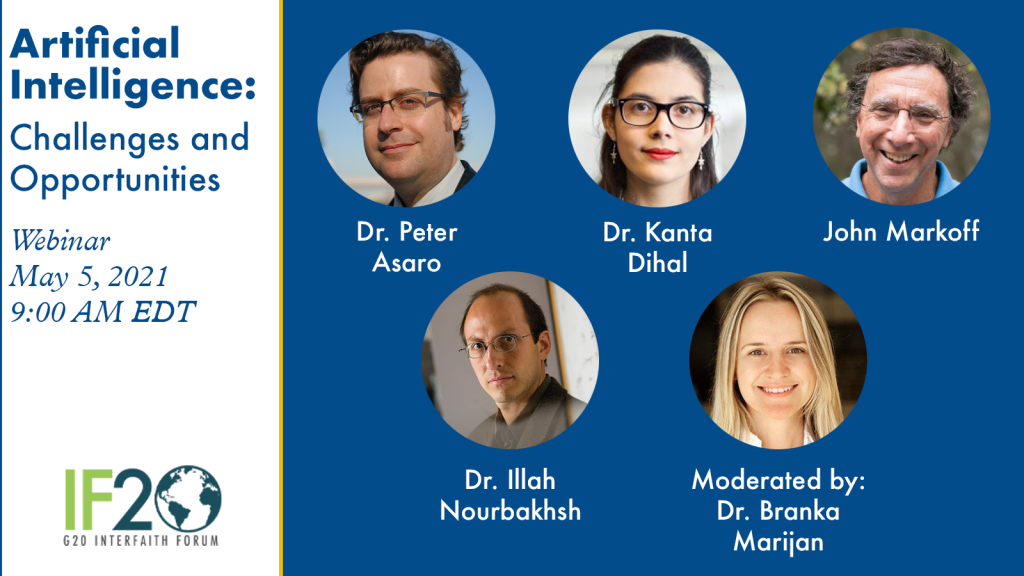
WEBINAR
Artificial Intelligence: Challenges and Opportunities
On Wednesday, May 5th, the G20 Interfaith Forum’s working group on Research and Innovation for Science, Technology and Infrastructure held their first webinar, “Artificial Intelligence: Challenges and Opportunities.” Panelists included Dr. Peter Asaro, Associate Professor in the School of Media Studies at the New School in New York City; Dr. Kanta Dihal, Senior Research Fellow at the Leverhulme Centre for the Future of Intelligence, University of Cambridge; John Markoff, Journalist and Research Affiliate, Institute for Human-Centered Artificial Intelligence, Stanford University; Dr. Selma Šabanović, Associate Professor, School of Informatics and Computing, Indiana University; and Dr. Branka Marijan, Senior Researcher, Project Ploughshares.
The event addressed important questions being raised surrounding advancements in Artificial Intelligence and robotics: How can a human-centered AI design be ensured? What are the main concerns that require ethical considerations and governance responses? What role is there for the developers of these technologies? How can we combine research and innovation in a globally competitive environment and construct an international dialogue and framework fostering human rights?
Both remarks from panelists and input from viewers are intended to be used in furthering the working group’s preparation of policy recommendations for the G20 Summit leaders in Italy this fall.
Dr. Branka Marijan, who moderated the discussion, began by asking each panelist to outline what development around AI technology they were most excited about, in addition to their greatest concern.
Dr. Kanta Dihal
Dihal, who focuses much of her research on the different ways Artificial Intelligence has been imagined and portrayed throughout history (and how those narratives affect AI), focused on the fact that AI-centered societies are typically portrayed as extremes: either utopian or dystopian.
However, based on recent surveys of the British public, Dihal said that some traditionally “utopian” scenarios are beginning to be viewed with some trepidation, signaling a misalignment between positive narratives and negative public response, particularly in regard to AI reaching and surpassing human social interaction skill levels.
Dr. Selma Šabanović
Šabanović expressed excitement over the potential AI offers in the public health sector, particularly in serving the elderly, but focused her comments on one main concern: The lack of diversity and inclusion in the design of these machines. With the majority of AI designers, ideators, and developers coming from W.E.I.R.D. (Western, Educated, Industrialized, Rich, and Democratic) backgrounds, she believes that care needs to be taken to incorporate a more balanced value set to benefit all humanity:
«What I’d like to call for is efforts to integrate a more complex understanding of social issues and realities into the design of these machines, and to create a more participatory framework for how we invest in and develop these technologies.
John Markoff
Markoff said the heart of AI development – and by extension, the concerns around AI – is a debate between two philosophies: Whether to replace the human mind or simply extend it.
With language models becoming more and more advanced, and conversational AI’s entering the market, Markoff said he found it a hopeful sign that so many ethics classes and discussions are popping up around the topic, because he sees the challenges posed by deception to be a large issue.
Dr. Peter Asaro
Asaro made the point that AI, as a «technological mirror of how we think of ourselves», is simultaneously a philosophical theory about emotion/interaction and a practical tool, resulting sometimes in unexpected outcomes.
«The institutions and individuals who have the power to shape these systems will have their interests advanced, and those without that power will be left out – whether we’re talking about social manipulation, technological unemployment, mass deception, biometric technologies collecting mass amounts of private data, etc.».
He referred to how AI is already changing the world at large, and the questions it is raising regarding its «decision-making» capabilities: Should autonomous weapons systems be able to make life-and-death decisions? Should AI be able to decide whether you’ll get a loan or a job? «Let’s not make the mistake of thinking that these machines understand things that they don’t understand. They aren’t moral or legal agents».
Q&A—Regulation
The first issue brought to the panelists regarded the EU’s new privacy regulation plans, and government regulation of AI in general:
«The prohibition against deception is, in my opinion, one of the most important issues we need to deal with going forward. We have a tendency to anthropomorphize almost anything we interact with, and therefore we often trust too easily», John Markoff.
«These processes aren’t in the hand of democratic governments – they’re in the hand of corporations – so giving people a voice is going to be hard to achieve», Dr. Kanta Dihal.
«Big Tech has been able to keep private control over the data they’re collecting and the algorithms they’re using, and it’s transforming our society in ways we have yet to completely understand. We need a new sort of social contract to address these issues, particularly for democratic societies. The old versions of anti-trust laws aren’t sufficient to address the phenomenon we have with these companies that are shaping our attitudes, the redistribution of wealth, etc.», Dr. Peter Asaro.
Q&A—Religion
As the focus of the discussion moved to what religion could offer AI and vice versa – along with looking at the intriguing claim that AI was a religion unto itself – Dr. Kanta Dihal spoke of three points that most world religions and AI have in common:
- The belief that humanity is different than all the other animals, which is often connected to tool use (enabling humans to achieve the pinnacle of their potential);
- A “creationist”-type belief that making something so alive and capable of decisions is akin to becoming like the gods;
- A power to shape people’s morals, thoughts, and actions.
Dr. Selma Šabanović added that both AI and religion exist to improve our communities and the state of the world at large – and that neither work effectively through following simplistic sets of rules to the letter. They work through social engagement rather than division and exclusion, applying principles and good judgement to highly dynamic situations.
In conclusion, Robert Geraci spoke on behalf of the Working Group, thanking the panelists, acknowledging the work to do moving forward, and committing to take what was learned at the webinar to provide focused policy advice that will benefit the global community.
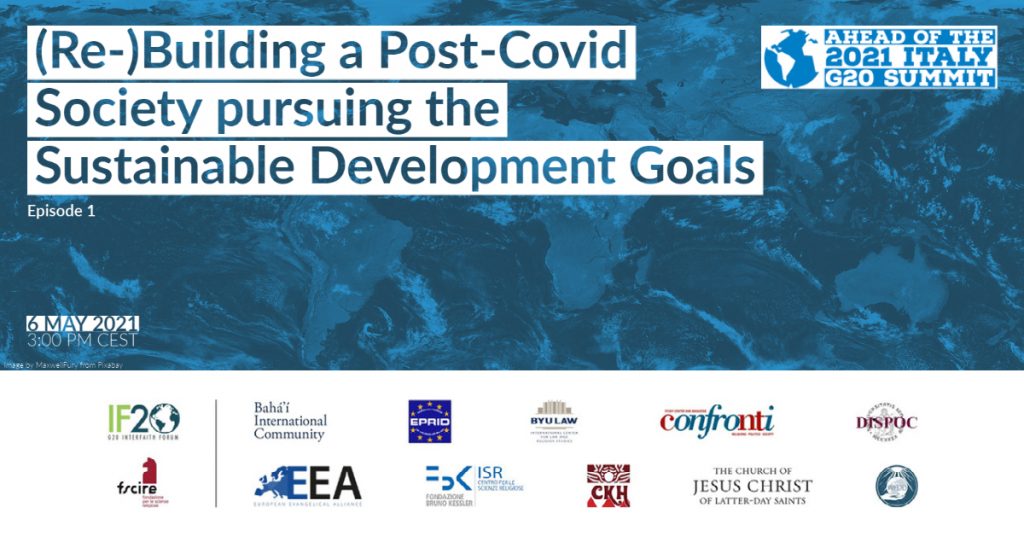
WEBINAR
Ahead of the G20: (Re-)Building a Post-Covid Society pursuing the Sustainable Development Goals
On Thursday, May 6th, the G20 Interfaith Forum (IF20), together with eleven partner organizations, held the first installment of its “Ahead of the 2021 Italy G20 Summit” webinar series: “(Re-)Building a Post-Covid Society Pursuing the Sustainable Development Goals.” Partner organizations included the Fondazione per le scienze religiose (FSCIRE); The Baha’i International Community; The European Evangelical Alliance; The European Platform Against Religious Intolerance and Discrimination; The Fondazione Bruno Kessler; The International Center for Law and Religion Studies at Brigham Young University; The King Hamad Chair for Inter-Faith Dialogue and Peaceful Co-existence at the Sapienza University of Rome; The Study Center and Magazine Confronti; The Church of Jesus Christ of Latter-day Saints – European Union & International Affairs Office; The University of Siena; and the World Faith Development Dialogue. Panelists included Prof. W. Cole Durham, G20 Interfaith Association President and Founding Director of the International Center for Law and Religion Studies at Brigham Young University; Prof. Katherine Marshall, G20 Interfaith Association Vice President and Executive Director of the World Faiths Development Dialogue; and Prof. Alberto Melloni, Secretary of the Fondazione per le scienze religiose (FSCIRE), the G20 Interfaith Forum’s Italian host. Prof. Marco Ventura of the Bruno Kessler Foundation and Dr. Pasquale Annicchino at the European University Institute in Florence acted as moderators.
The event focused on implementing the Sustainable Development Goals (SDGs) in concrete ways to build a better post-COVID world, drawing on the vision of the three G20 Interfaith Forum leaders and their interpretation of the essential roles that both faith and policy will play in pursuing measurable progress. Leading up to the G20 Summit and G20 Interfaith Forum meetings in Italy this fall, this webinar aimed to offer an overarching view of important focuses and necessary action related to religion and the G20 Italian Presidency’s three areas of focus: People, Planet, and Prosperity.
Prof. Marco Ventura, who assisted in moderating the discussion, introduced the topic and asked each of the panelists to begin by outlining their vision for how to reach a more just, equitable, and healthy post-COVID society, in the context of the SDGs.
Prof. Katherine Marshall
Marshall began her comments by outlining the history and underlying purpose of the Sustainable Development Goals that were unanimously approved by the UN General Assembly in 2015. They are sometimes referred to as the “global goals” or the “global agenda”. Initially designed to bring discipline (and a focus on results) to the work being done by the UN, most of the 17 goals are pointed at a 2030 deadline. The goals weren’t fully on track before the onset of the global pandemic, and they’re even more behind now.
In terms of the G20 Interfaith Forum, Marshall outlined two main challenges to be addressed: 1. Though the SDGs are complex, with 17 goals and 169 targets, religion plays a role in each one. The IF20 needs to highlight the relevance and work of its extraordinary networks, which bring together the religions of the world.
- «We talk about building back better, building back greener, building back fairer, and that is also a goal of the G20 Interfaith Forum—to utilize the SDGs to make this post-COVID world a more accountable, balanced one».
Prof. Alberto Melloni
Melloni focused his comments on the increasing extremism fueled by COVID-19, and the upcoming Italy G20 Interfaith Forum’s focus on a «fourth P» in addition to People, Planet and Prosperity: Peace.
«The pandemic has taught us that we are much more vulnerable and incapable of reaction than expected. Some people have used this as an opportunity to increase dialogue and unity, while others have used it as an opportunity to attack and ostracize others. The people in the ‘gray zone’ between those two extremes is where we need to focus. We need to help them see their future with less pessimism».
Prof. W. Cole Durham, Jr.
Durham spoke of the vast untapped opportunities connected to more fully involving the broad religious sector in re-building efforts:
«Too often in the contemporary world, political leaders and policymakers tend to ignore religion. In terms of our need for relevant, pluralistic voices in the global agenda, religion is absolutely essential. There are areas where, despite the vast difference among religions, there is consensus. And figuring out how to speak on these is extremely important. It’s hard to imagine the SDGs optimally achieved without involving religion».
Q&A: How does the IF20 fit into this G20 context?
Prof. Melloni provided context to the first question of the webinar’s Q&A session by outlining the G20 Interfaith Forum’s current interactions with the Italian G20 Presidency, highlighting religion’s ability to be simultaneously separate from and interconnected with all areas within the G20 structure, effectively connecting the people to the policymakers.
Prof. Durham explained the two primary levels that the IF20 operates on:
- Recommending specific priorities to G20 leaders within established processes, providing an agile and fresh perspective in times of unexpected calamity or crisis;
- Acting as a “network of networks”, bringing together in high-level ways some of the key religious institutions on Earth—and providing tremendous value by forging those connections.
Prof. Marshall brought the conversation full-circle by referencing the specific contributions of religious leaders and communities in the current crisis: Promoting a global ethic that emphasizes caring for the forgotten and vulnerable, helping the G20 move beyond rhetoric to action, and playing an essential role in promoting public health, vaccine acceptance, etc.
Conclusion
In conclusion, Prof. Ventura asked the panelists to offer final remarks on the issue, taking into account a changing world and a constantly evolving international outlook.
Prof. Durham spoke of the IF20’s need to continue to find greater opportunities for outreach – through youth, online conversations, new institutional connections, etc.
«We’re facing new challenges. We will continue to see civilizational differences. We need to take advantage of institutional pluralism and draw on this plurality to gain a much richer perspective as we craft solutions. And in all of these processes, religion can springboard our progress with a higher vision».
Prof. Marshall referenced the increased movement toward true diversity in the US over the past year, connecting that to the extraordinary diversity of religious communities and the roles they fill. In the context of the G20’s «practical paradox» – increased agility and ability to act as a smaller group, but the disadvantage of excluding so many global voices – Marshall said she hopes the IF20 can continue to fill a role in making sure some of the important but often-neglected voices (like those from Africa, indigenous communities, and religious minorities) are heard and that the most vulnerable are never far from sight.